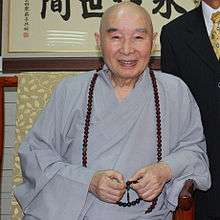Chin Kung
| Chin Kung 淨空 | |
|---|---|
 | |
| Religion | Buddhism |
| School | Pure Land |
| Personal | |
| Born |
1927 Lujiang County, Anhui Province, China |
| Senior posting | |
| Title | Venerable |
| Religious career | |
| Teacher | Lee Ping-nan |
Chin Kung, AM (淨空; pinyin: Jìngkōng) (b. 1927) is a Buddhist monk from the Mahayana tradition. He is the founder of the Corporate Body of the Buddha Educational Foundation, an organization based on the teachings of Pure Land Buddhism.
He was born in Lujiang County, Anhui Province, China under the birth name of Hsu Yeh-hong (Xú Yèhóng 徐業鴻). He spent thirteen years studying Buddhism and Philosophy under the guidance of Professor Fang Tung-mei (方東美), Changkya Khutukhtu (章嘉呼圖克圖 a master in Mongolian Buddhist tradition), and lay teacher Lee Ping-nan (李炳南). He entered the monastic life in 1959, where he was ordained at Lintzi Temple at Yuanshan in Taipei, Taiwan. It was then that he received the name of Chin Kung, meaning "pure emptiness".
Master Chin Kung is well known for using modern technology to spread the Buddha's teachings. His lectures are recorded on audio, video tapes and CDs for wide distribution in many temples, including many Buddhist temples and centers where people can pick up books to distribute to other places.
He has sponsored the printing and the distribution of Buddhist texts worldwide, as well as portraits and pictures of various buddhas and bodhisattvas. All these items have been distributed free of charge.
In recent years, Chin Kung has emphasized the Infinite Life Sutra and the Pure Land cultivation method of Buddha recitation which is concerned mainly with the recitation of Amitābha Buddha's name.
Chin Kung was the ordination master for actress Chen Xiaoxu. He is currently residing in Australia.
Achievements
Chin Kung had worked categorically on Buddhist teachings to bridge gaps and reconcile misunderstandings between different faiths through interfaith visits and dialogues, especially in Asia and Australia. In recognition of his achievements, he has been bestowed several awards and honours.
In 2002, he was awarded an Honorary Professorship from the University of Queensland, Australia and an Honorary Doctorate from Griffith University, Australia. In December 2003, he was awarded the Honorary Founding Patron of the Australian Centre for Peace and Conflict Studies at the University of Queensland, Australia. In April 2004, he was awarded the Honorary Doctor Degree of University of Southern Queensland. He was then further granted the Honorary Doctor Degree of Syarif Hidayatullan State Islamic University, Jakarta Indonesia in June. In August, he was invited to present a paper at the 2004 Okayama Topia for International Contribution NGO Network Conference on the United Nations.
In June 2005, venerable Chin Kung was appointed as a member in the General Division of the Order of Australia by Queen Elizabeth II.[1] He was recognised for service to the Buddhist community in Queensland, particularly through the promotion of Buddhism and the fostering interfaith activities between diverse ethnic groups, and to the community through support for educational and health institutions.
In 2006 he sponsored and attended actively the solemn and sumptuous celebration of the 2550th birthday of the Buddha Shakyamuni, which took place in the office of the UNESCO in Paris, organized by the Venerable Tampalawela Dhammaratana, ex-president of the Buddhist Union of France, it was an event of international scale, that left a big influence in the Buddhist and non-Buddhist world, by the distribution of its message of world peace and peace of mind in the heart of each.
Understanding of Buddhism
Chin Kung categorizes Buddhism in practice into four different types.[2] First, traditional Buddhism, the teachings of Buddha Shakyamuni, which is very rare in our days. Second, religious Buddhism, which does not represent the real Buddhism but it becomes recognized by the society, since temples nowadays no longer practice intense teachings and meditation as they once did. Third, the academic Buddhism being taught in many universities today, where Buddhism is treated purely as a philosophy. This is not comprehensive either since Buddha's education covers everything essential to human beings rather than being one branch of the whole knowledge. Finally, the total degeneration of Buddhism into a cult. This type of Buddhism came into being in the late Twentieth Century, and does great harm to society. Chin Kung tries to correct these misunderstandings and lead the public back to the original form of Buddhism as taught by Buddha Shakyamuni.
Books
Chin Kung has authored the following books[3]
- The Art of Living
- Buddhism as an Education
- Buddhism: The Awakening of Compassion and Wisdom
- The Collected Works of Master Chin Kung
- Path to True Happiness
- To Understand Buddhism
References
- ↑ Australia's Highest Honour awarded to Master Chin Kung
- ↑ Buddhism as an education
- ↑ "Buddhist Masters & Their Organisations". Buddhanet. Retrieved 14 March 2013.
External links
- Master Chin Kung | facebook
- Official site of the Amitabha Buddhist Society
- Biography of Ven. Master Chin Kung
- Journey to Peace
- Collected talks of Master Chin Kung
- 净空法师文集